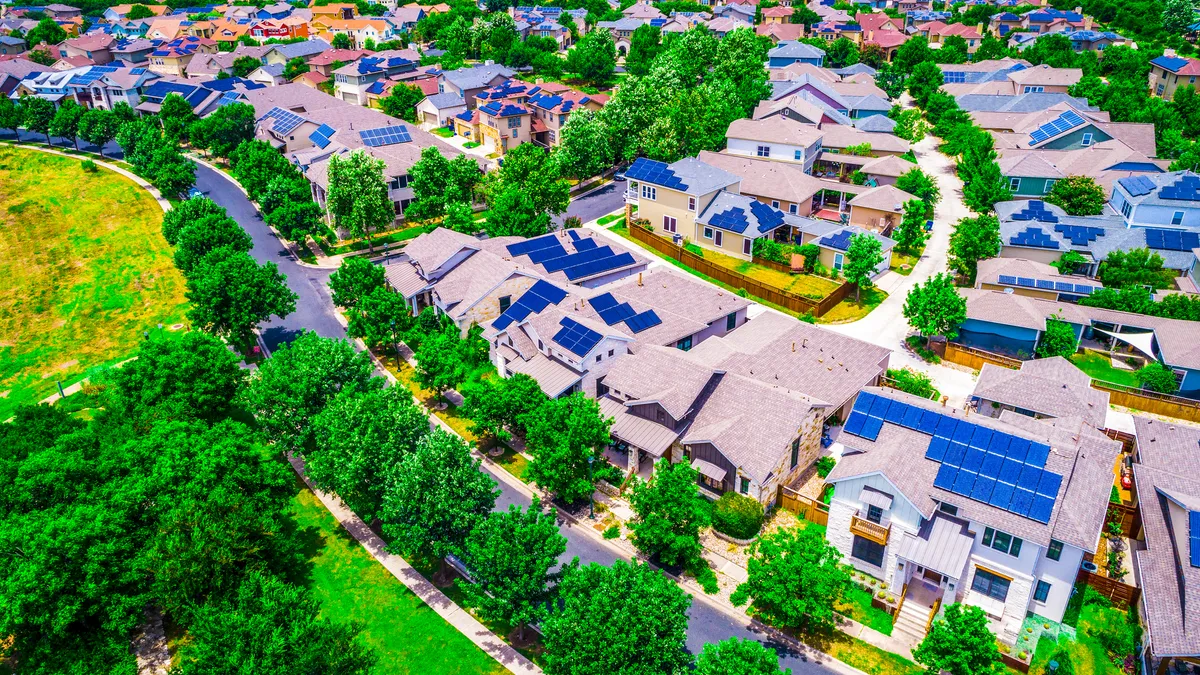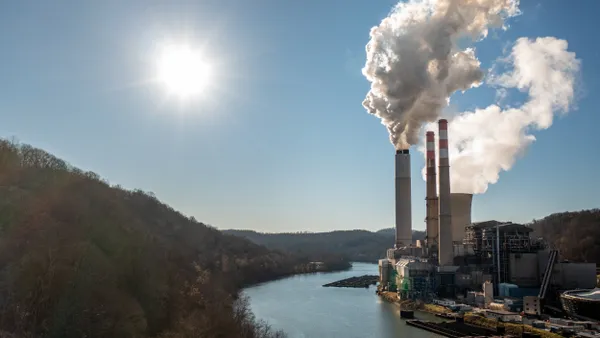Dive Brief:
- The Virginia State Corporation Commission struck down on Aug. 30 Dominion Energy’s interconnection parameters for certain net-metered distributed energy resources, which the Virginia Distributed Solar Alliance, or VA-DSA, said posed “unreasonable” barriers to small solar projects.
- The injunction suspends the parameters and allows development to continue on mid-sized, non-residential net-metered projects, pending the results of two interconnection dockets. The SCC said Dominion violated state code by implementing the rules without the commission’s approval.
- Dominion argued in its filings that the parameters were necessary for safe and reliable grid operation, but VA-DSA chair and cofounder Tony Smith said in an interview that an evidentiary memo provided by the Interstate Renewable Energy Council had “put to rest any questions about safety and reliability.”
Dive Insight:
“It's not about safety and reliability, it's about doing something illegal,” said Smith, who is also the president and co-founder of Secure Solar Futures. “We were very pleased, if not overjoyed, that the Commission concurred and issued injunctive relief.”
In their petition to overturn the rules, VA-DSA had argued that Dominion’s parameters posed “substantial new costs” on projects ranging from 250 kW up to 1 MW by setting forth requirements for substation upgrades, direct transfer trip dark fiber cable and distributed generation relay equipment – requirements which they wrote “are not required by the Interconnection Rules and [net energy metering] Rules, nor, prior to mid-2022, were they required by Dominion.”
Estimates from Dominion put the cost of dark fiber from $150,000 to $250,000 per mile, and the cost of purchasing and installing a DG relay panel anywhere from $450,000 to $1,450,000. This made mid-sized net-metered projects “infeasible” for the customer generators of VA-DSA members – “including public schools, municipalities, and other public and private entities seeking to achieve their sustainability goals,” they wrote.
The SCC followed the recommendation of its hearing examiner Mary Beth Adams and issued VA-DSA’s requested injunction against the parameters on the basis that Dominion had violated the “nondiscriminatory access to transmission and distribution system” section of Virginia’s state code. The parameters will be suspended “at least” until the SCC rules on two open interconnection dockets, the commission said in its decision.
“We're fortunate that the Commission stood up for its authority to rule on these matters,” Smith said. “Had Dominion prevailed against us on this petition, that would have been a signal to other utilities that they could claim safety and reliability concerns for essentially throwing out the books as far as how they’re supposed to be regulated and pursue good utility practices.”
In an email, Dominion spokesperson Jeremy Slayton said that the utility will continue to evaluate the SCC’s order to determine its next steps.
“Our filings and interconnection requirements are designed to ensure the same safety and reliability standard, regardless of who builds and operates the generation sources on the grid. We believe this to be critical to maintaining a reliable energy grid,” Slayton said.
Smith said he, along with other solar developers in Virginia, have had “really good relationships” with individual Dominion employees, including CEO Robert Blue. “It's not that there's no precedent for collaboration. It's just very informal, and episodic,” he said.
He hopes that the increasing adoption of renewable energy, a less centralized form of generation, will create an environment where Virginia’s distributed solar developers can “seek collaborative advantage” with Dominion.
“We need Dominion to not only survive, but to thrive,” Smith said. “The worst thing that could happen in Virginia would be for Dominion to entirely collapse – that would be a disaster.”
VA-DSA’s next priority, Smith said, is receiving clarity from Dominion and the SCC on implementation and compliance of the commission’s final ruling. Though the VA-DSA had expressed interest in seeking compensation from Dominion for the costs incurred by project delays and cancelations, Smith said the alliance is no longer pursuing that.
Connor Kish, director of the Virginia Sierra Club – a VA-DSA member – said the priority for clean energy advocates in the state is now ensuring that the projects impacted by the rules can “get back off the ground.”
“Secondly, I hope people who are interested in continuing or placing distributed generation assets now go for it, because it is clear that the law of Virginia allows for distributed generation,” Kish said. “And I think that the ruling should give some comfort to either citizens or companies or financers, that they can go ahead and move forward.”














